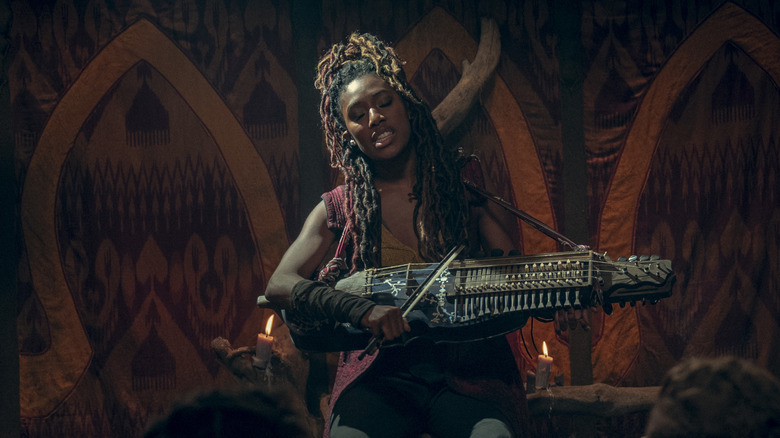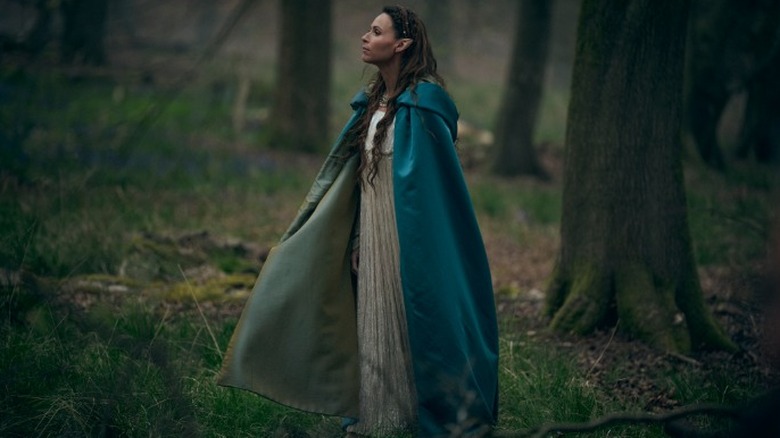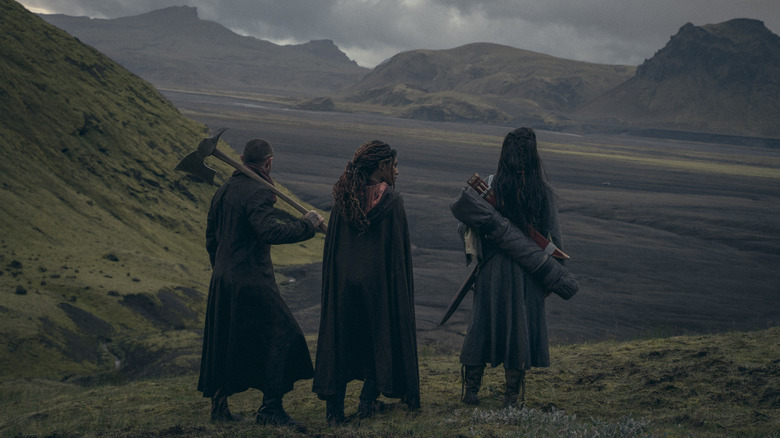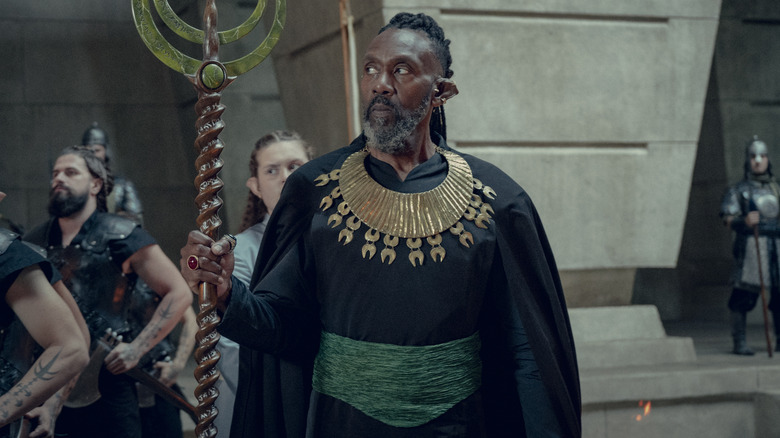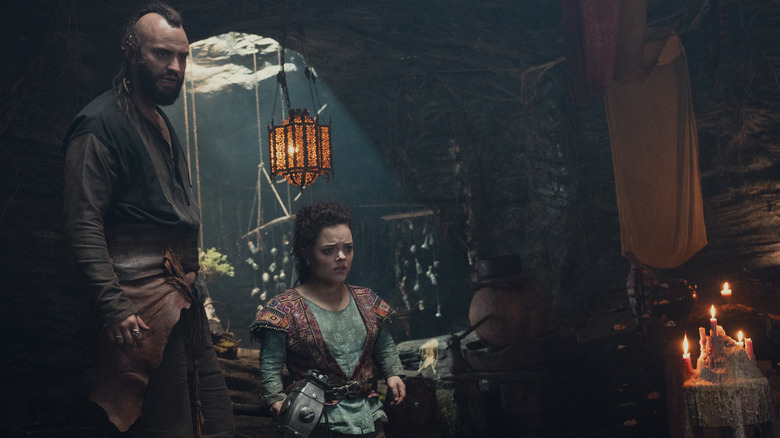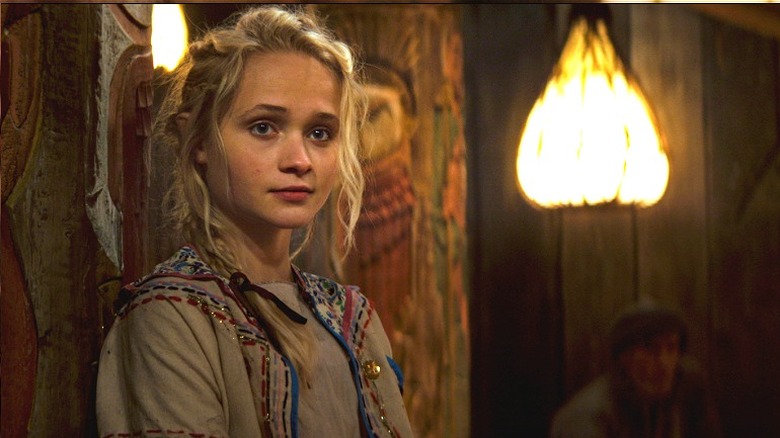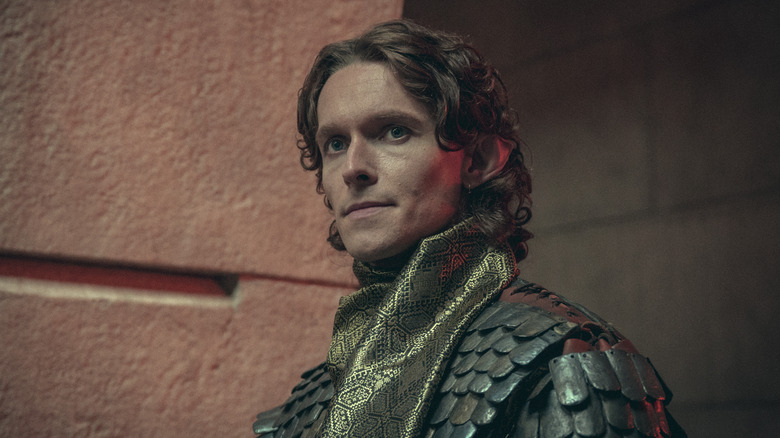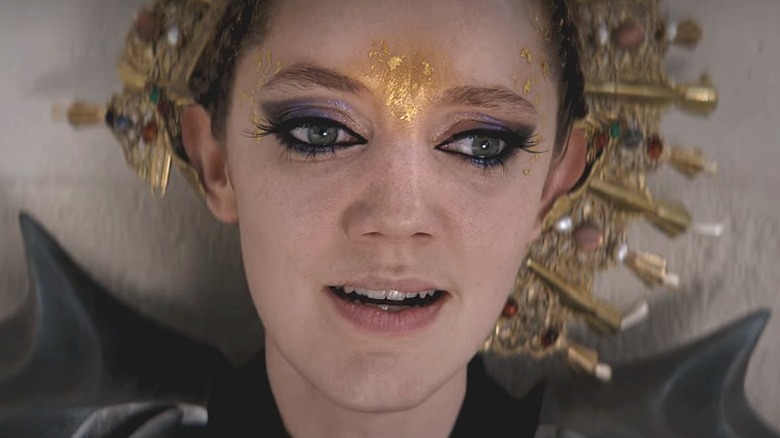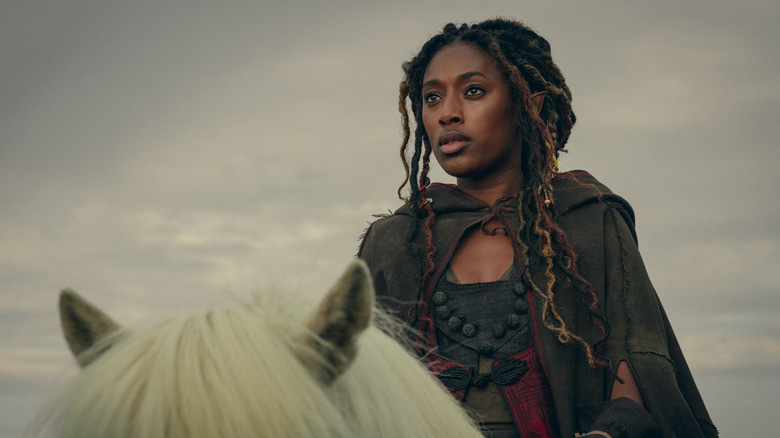The Witcher: Blood Origin Isn't The Failure People Want It To Be
Before we dive in, let's go ahead and shelve the irrelevant and hate-fueled complaints that have been flung at both "The Witcher" and Declan de Barra and Lauren Schmidt Hissrich's "The Witcher: Blood Origin." The fact that such backlash continues to plague the franchise is inarguably worth calling out, but a defense of the series' narrative success requires that we distinguish between (1) dumpster rants from toxic fandom and (2) actual audience criticism. And since there's a fair amount of legitimate criticism to explore in regard to "Blood Origin," to ignore it does both the series' less vitriolic fans, and the work itself, a disservice.
Great. Since that is now out of the way, let's address said actual criticism, including the following arguments: First, that the prequel altered or disregarded its source material. Secondly, that it was rushed to production and therefore too thin and too short. Finally, that it sacrificed Andrzej Spakowski's lore to forward its own "agenda."
Some of these complaints aren't entirely without merit — the series could have benefited from another episode, or a handful of more thorough transitions — a point to which we'll return. Unfortunately, much of the most fervent criticism of "Blood Origin" fails to consider a number of important, mitigating elements, including: Spakowski's own recurring themes, theses, and subtext, the literary tradition in which "The Witcher" operates and upon which Spakowski's saga ends, and the fact that the series' abundantly clear thematic intention — and its embrace and reiteration of these elements — relies on a very particular stylistic and mechanical approach.
Blood Origin leaned in to Spakowski's end note
To truly understand and engage with a story's prequel — particularly this story's — we must first acknowledge and understand both its ultimate ending and the narrative tradition that allows that ending to make sense. Part of what makes Spakowski's epic so fascinating is the enormous range of its own "source material." The novels are a globally-inspired mosaic of folkloric, historical, allegorical, mythological, and theological storytelling traditions. And while it's neither relevant nor accurate to suggest the author favors any one of them, it's Arthurian literature — and Spakowski's simultaneous celebration and subversion of it — that serves as one of the saga's major foundational through-lines and its end note.
Nowhere is this tradition more directly, even titularly, called-upon than in the final installment in Geralt, Yennefer, and Ciri's story, "The Lady of the Lake." It's no surprise, then, that De Barra and Schmidt Hissrich chose to lean similarly into a celebration and subversion of Arthurian ethos, mechanics, and archetypes in their prequel, in a kind of "bookend" approach.
So why does this matter? Does one need to be an Arthurian expert in order to fully appreciate "Blood Origin?" Absolutely not. The sheer cultural and literary ubiquity of the tradition is part of what allows it to function so well and with such thematic clarity for a range of audiences. But the shared Arthurian elements here are worth exploring, since they go a long way toward explaining the far too hastily rejected (or ignored) risk taking that "Blood Origin" offers.
Blood Origin was pretty clear about its intentions
Remember that one, singular Arthurian novel or series that fully fleshes out each and every one of the Knights of the Round Table, gives us a nuanced and relatable Arthur, and details in-full, and once and for all, his backstory, beliefs, and actions? Of course not, because it doesn't exist. Look for the Excalibur-wielding, tragically betrayed King of Camelot, his shiny armor, and his big round table in the character's earliest Welsh origins — or even in more familiar (relatively) early iterations, such as Geoffrey of Monmouth's 12th century, precedent-setting spin — and you'll have a hard time finding him. Look, instead, for what the character symbolized, came to symbolize, and has continued to symbolize across the past 1600+ years (and, importantly, across a vast range of political and social contexts), and you'll have a hard time not finding him.
To sum up centuries upon centuries of Arthurian iterations, adaptations, and allusions, the notion of a strong and virtuous individual from the past returning to save us and our future from the oppression of the present represents one thing: hope (as in, the exact thing "Blood Origin" tells us, from the very beginning, that its narrative means to provide). Obviously, and relevantly, "hope" means wildly different things to different societies, and it's in the prequel's distinct understanding and portrayal of hope that the brilliance of "Blood Origin" lies.
The prequel's form is important...
For everyone — from the 5th century, post-Romano Celts in Wales, Cornwall, and Brittany, to Henry VIII, J.R.R. Tolkien, and even JFK, to writers who've given the legend some necessary updates (e.g., Mike Barr, Tracy Deonn, and Kiersten White) — Arthur has come in a different form, fought for a different cause, and served a different set of ideals. The revolutionary, meta version of "Arthur" offered by "Blood Origin" is what most sets the series apart, connects it to its source material, and frees it from the expectations and confines of traditional fantasy TV. Or at least, it should have.
In "Blood Origin," it isn't a king, a warrior, or even a more modern, reluctant hero that comes to humanity's rescue, but story itself. And it's the power of storytelling — not an individual, a fabled table, or a holy grail — that serves as the legacy of our various "knights" and their mutual quest. Hence the bounty on their heads and repeated references to the danger their very existence poses to those in power: "That's a heroic folktale waiting to happen," as Lenny Henry's Balor says.
Let's not forget that "Blood Origin" isn't the story of a group of bickering outcasts who band together to defeat an oppressive evil against all odds. It's the story of Minnie Driver's Seanchai telling the long-forgotten story of a group of bickering outcasts who banded together to defeat (etc., etc.), so that our "contemporary" bard, Joey Batey's Jaskier, can use the power of that story to inspire hope. This story-in-a-story technique is extremely important, for several reasons.
...and yet, it was repeatedly ignored
If our main cast of heroes and relationships feel less than fully-fleshed out (as various reviews have rightly noted, including CNET's, NBC's, and Collider's), it's because they're not intended to be taken as wholly literal, flesh-and-blood figures, but as archetypal, allegorical heroes whose virtues, deeds, romances, and sacrifices exist to serve a greater, timeless purpose — one that Seanchai is wielding in much the same way her literary counterpart Merlin wields his magic. If our premise looks and feels all too familiar (as the series relies on and embraces, but as several reviews, including The Hollywood Reporter's and Indie Wire's, point out as a negative) it's because that premise is our hero. That's the take. It's all been "done to death" for a reason, and the reason is this: humanity will always need hope.
We're repeatedly reminded of the fact that these characters are meant more to represent and symbolize than to serve as new, actual characters ("one became two... two became three... three became four..." etc.), and if Seanchai's frequent interjections fail to remind us of this, the series' innumerable, overt nods to other Arthurian-infused tales put an even finer point on their purpose.
This approach — and the fact that the series is a prequel to a saga that is, itself, thoroughly wrapped up in the mechanics of storytelling, the questionable veracity of The Continent's history, and the blurred line between mythology and that history — should have insulated "Blood Origin" from the abundance of "but that's not canon" backlash it received.
The prequel came with an important caveat
Spakowski's characters are frequently faced with the fact that what they think they know might not be true, and for good reason. One of the most important themes in "The Witcher" (and the reason we get so many passages from in-world history books) is the malleable notion of "truth," and the impact various kingdoms' and species' notion of the past has on their beliefs and worldview. In "Blood of Elves," one dwarf's disdain for the actions of a violent rebel faction (the Scoai'tael) speaks to this theme with pristine clarity: "Maybe in a few years' time," he says, "I'll be called a traitor who sold out and they'll be heroes ... Our history, the history of our world, has seen events turn out like that" (p. 142).
If anything, by adding to (though, for what it's worth, not actually contradicting) the known story of the "first" Witcher revealed in "Season of Storms" (p. 124), "Blood Origin" is honoring its source material's ability to keep readers on their toes by forcing them to consistently question The Continent's reality — and, by extension, their own. What's more, the fact that "Blood Origin" introduces time travel cannot be ignored. Once time travel enters the frame, all bets — and any and all assumptions about how a prequel or origin story relates to, alters, or opposes, later events — are off. See: J.J. Abrams' "Star Trek," in which time travel incites an alternate reality and allows the film to simultaneously celebrate and alter assumed events/canon.
So, let's take stock ...
No, it wasn't perfect, but ...
Thus far, we have a series that: upholds, embraces, and reiterates its source material's celebration of a particular literary tradition, and puts a fresh twist on that tradition by giving us an "Arthur" who isn't a "once and future King," but "a once and future story." And we have a group of characters who, just like our author's characters, both run on and subvert elements of that celebrated literary tradition, and allow it to speak, with overt relevance, to the 21st century.
So, what's the problem?
Here's where some of the criticism the series received is valid. Yes, "Blood Origin" needed a fifth episode: two leading up to a turning point, a turning point, and two leading past the turning point into the conclusion. As is, there's clearly some connective tissue missing. But the fact that we only get four, and those four still manage to accomplish what the series set out to do thematically, speaks to the success of "Blood Origin," not its failure. And a good portion of its "too-rushed" critique fades away with a thorough consideration of its stylistic approach.
As for the litany of fans who took issue with its use and ostensible contradiction of Spakowski's lore (see: this Reddit thread, and countless others), there are a few important things to keep in mind: In addition to the time travel curveball, we have no idea where Season 3 of "The Witcher" — an adaptation, not a superfluous "cover" — will take said lore. Moreover, the specific plot points and historical details of Spakowski's world and novels are merely the threads its narrative tapestry employs to form a greater image — they are not the image itself, the image's meaning, or the ongoing relevance, value, and legacy of that meaning.
...Blood Origin at least took a stylistic risk
"Blood Origin" had a choice to make. It could speak to the forest, or it could speak to the trees. Since it was bound to incur the wrath of fans either way, it chose the (less tangible) forest. Unfortunately, while modern fantasy series employ the same motifs and techniques as their narrative ancestors, they tend to try and make them less fantastical by imbuing them with more modern narrative traits. Both Marvel and DC, for instance, have been hellbent on giving us "realistic" and "relatable" superheroes (with varying degrees of success) ever since Christopher Nolan imagined that a mega rich dude dressed up as a bat might be a feasible element of a gritty, tangible reality. Even fantastical series that take place in other realms tie themselves in knots trying to stretch the archetypal and allegorical into the literal, and in all fairness, this can work exceptionally well.
More often than not, however, we all sit around pretending that done-to-death archetypes (e.g., the virginal warrior or the seductive temptress, aka several of the supposedly complex women in "Game of Thrones" and "Vikings") are somehow fresh, fully-dimensional takes on these characters. In accepting the notion of archetype and resisting the urge to posit the "veneer" of depth as actual depth, "Blood Origin" finally did give us a fresh take on these things — by using a (very) old narrative technique to speak to contemporary social conflicts.
That said, these risks didn't always pay off
Unfortunately, contemporary viewers aren't nearly as interested in allegory and theme as they are in the tangible (e.g., all the various presuppositions, accepted plot points, and "universe rules" that make up what we call "canon"). This isn't, in itself, a good thing or a bad thing. It's simply a reality of modern expectations for storytelling, and the reason "Blood Origin" — and its throwback approach to the genre — never stood a chance. At least, not when it's so easy to aggressively and instantaneously review bomb a film or series. No one gets bent out of shape when someone bends the rules of, for instance, accepted vampire lore. But if someone tries to alter or enhance what we know about more "contemporary" narratives, all hell breaks loose.
The truth is that "Blood Origin" doesn't, despite the Reddit and Rotten Tomatoes discourse, disrespect its source material — in fact, it holds Spakowski's story and its legacy in such high regard that it sees it, like its Arthurian and folkloric inspirations, as a story that can be told and retold, imagined and re-imagined, altered and added to, over and over again, in limitless social contexts and conflicts. If we continue to reject any attempt to stray from the confines of the Almighty Canon in our most beloved modern narratives, the future of storytelling — that distinctly human practice that has, as "Blood Origin" reminds us, provided so much hope for so many — we're only hurting ourselves.
The show's failures with audiences are due to its ambition
When you imagine Merlin, does he look sort of like Gandalf or Dumbledore? Our understanding of Merlin as the wise, old wizard with the long, white beard is in fact a much later addition to the Arthurian legend, as Dr. Dorsey Armstrong points out in "King Arthur: History and Legend." And if the Victorians had "review bombed" Alfred Tennyson's "Idylls of the King," well, forget about huge chunks of what we think we know and love about the legend, and any later, more contemporarily relevant reincarnations of him. We aren't suggesting that "Blood Origin" is on-par with Tennyson, but one needn't do so in order to appreciate the series' clear reverence for and belief in the power of Spakowski's legend. One needn't even agree with its alterations (though it's worth noting that, by his own admission, Sapkowski is far more accepting of those alterations than his fans).
That said: the fact that a series that checked so many boxes from both a stylistic and narrative standpoint boasts such absurd critical and audience scores says far, far more about us than it does about "Blood Origin." No, "Blood Origin" isn't a perfect series, and the various issues created by its four-episode format can't be ignored. But it understands, relies on, and captures the soul and essence of its source material, gives us a refreshingly unjaded and consistent thesis, and, admirably, took a huge risk by asking modern audiences to accept and engage with what is, essentially, a meta exercise in allegory.
Criticism is valuable — knee-jerk reactions are not
"Blood Origin" takes an approach that was never going to work for everyone, and that's okay. But to suggest "Blood Origin" isn't acutely aware of what it makes abundantly clear that it knows it's doing (as several critics have done), or to reject it for pinpointing and foregrounding its source material's ethos, traditions, and penchant for shifting realities rather than plot elements that were always subject to change (as several fans have done), is an inadequate and unfair means of assessing its success. What's more, it limits the saga's legacy and underestimates — and undercuts — the timelessness and thematic resonance already at play in Spakowski's story.
Have we grown so accustomed to the formulaic mechanics of streaming TV and IP adaptation that we're unable to embrace when a project tries to break out of that mold? Furthermore, do we really want to live in a world wherein the artist's first obligation isn't to their art, but to that art's ability to placate and appease? If so, there's not a hero or legend in the world that can come back from the dead and save us from our present, creative oppression, especially not when it's so thoroughly and enthusiastically self-induced.


